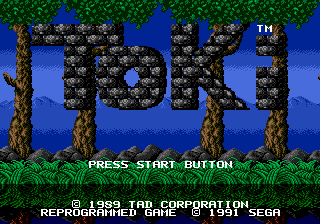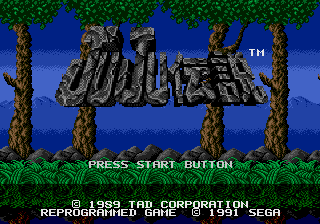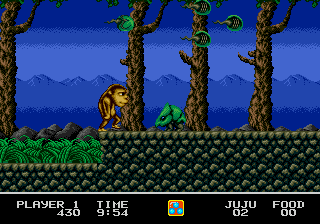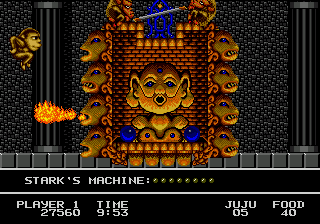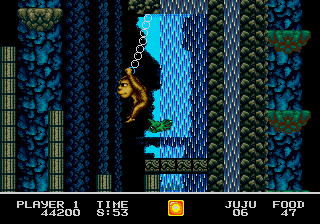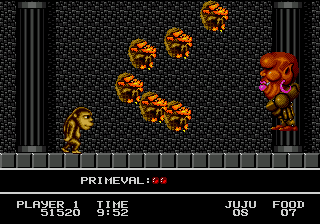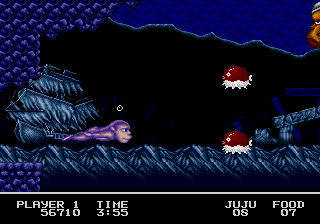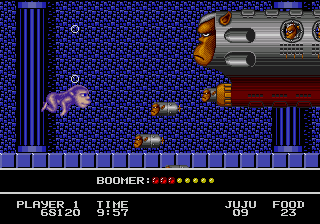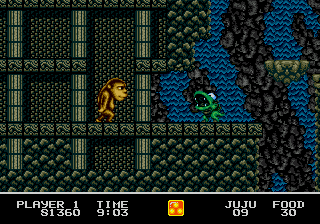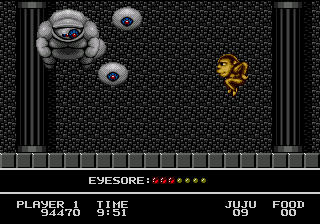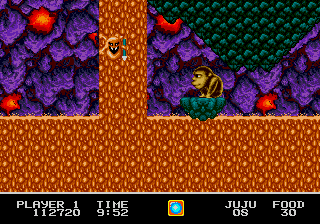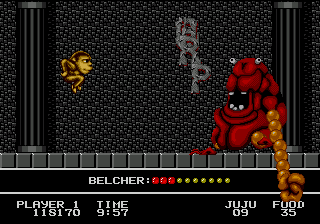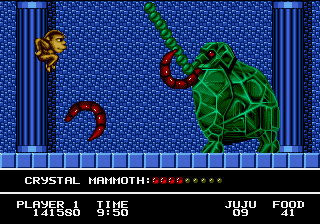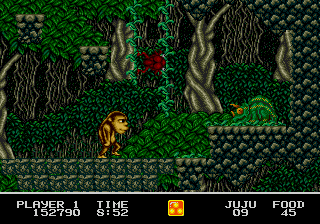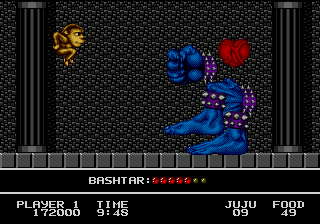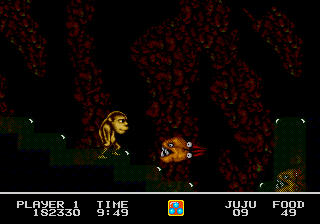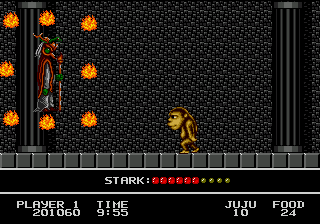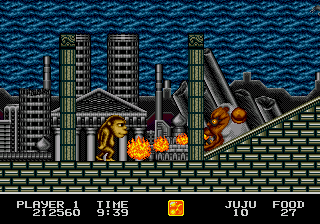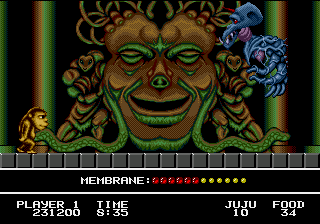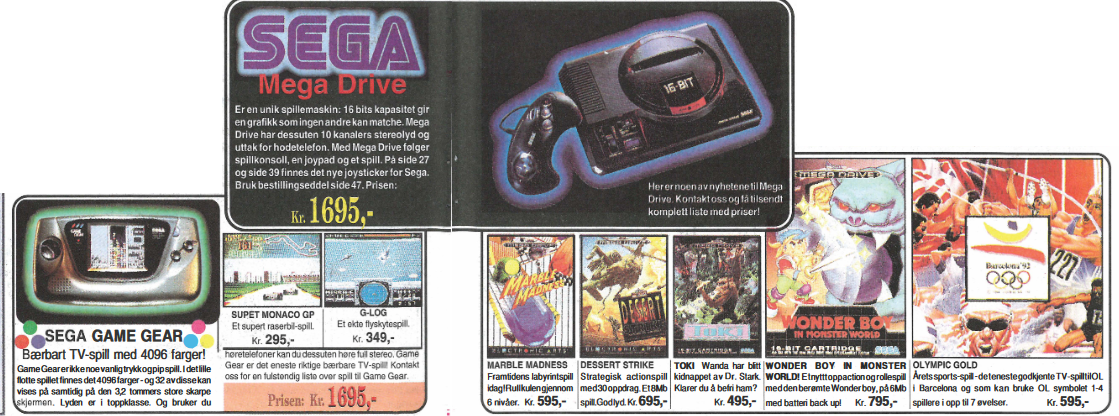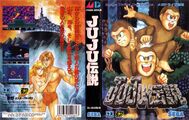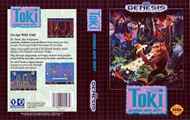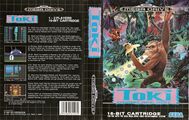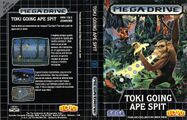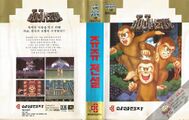Toki: Going Ape Spit
From Sega Retro
| |||||||||||||||||||||||||||||||||||||||||||||||||||||||
| Toki: Going Ape Spit | |||||||||||||||||||||||||||||||||||||||||||||||||||||||
|---|---|---|---|---|---|---|---|---|---|---|---|---|---|---|---|---|---|---|---|---|---|---|---|---|---|---|---|---|---|---|---|---|---|---|---|---|---|---|---|---|---|---|---|---|---|---|---|---|---|---|---|---|---|---|---|
| System(s): Sega Mega Drive | |||||||||||||||||||||||||||||||||||||||||||||||||||||||
| Publisher: Sega | |||||||||||||||||||||||||||||||||||||||||||||||||||||||
| Developer: Santos | |||||||||||||||||||||||||||||||||||||||||||||||||||||||
| Supporting companies: Sega CS (porting assistance) | |||||||||||||||||||||||||||||||||||||||||||||||||||||||
| Distributor: Ecofilmes (PT), Hent Gruppen (SE rental), Zegetron (GR), Tec Toy (BR), Samsung (KR) | |||||||||||||||||||||||||||||||||||||||||||||||||||||||
| Licensor: TAD Corporation | |||||||||||||||||||||||||||||||||||||||||||||||||||||||
| Original system(s): Arcade Boards | |||||||||||||||||||||||||||||||||||||||||||||||||||||||
| Developer(s) of original games: TAD Corporation | |||||||||||||||||||||||||||||||||||||||||||||||||||||||
| Sound driver: SMPS 68000 | |||||||||||||||||||||||||||||||||||||||||||||||||||||||
| Genre: Action[1][2][3] | |||||||||||||||||||||||||||||||||||||||||||||||||||||||
| Number of players: 1-2 | |||||||||||||||||||||||||||||||||||||||||||||||||||||||
|
Toki: Going Ape Spit, known in Japan as JuJu Densetsu (JuJu伝説, translated as Legend of JuJu in the manual and in-game credits), is a Sega Mega Drive action platform game developed by Santos and published by Sega. An expanded port of the titular 1989 TAD Corporation arcade title Toki, the game was first released in Japan in January 1992, and features additional levels not present in the arcade version.
The English title of the game is a juvenile pun on the phrase "going apeshit".
Contents
Story
The story is drastically different from the arcade original, and there are minor differences between the English and Japanese versions. It takes place in a time where humanity has willingly reverted to its primitive, natural lifestyle. A single genetic engineer, Dr. Andrew Stark (じじぃ, Jijie, in the Japanese version) clung to the previous ways and the people locked him in a cave out of fear, where he remained for so long they forgot about him (the English story also merges Dr. Stark with the witch doctor Vookimedlo, the main antagonist of the arcade version who also appears in the Mega Drive port).
In the present day exists the protagonist, a wild man named Toki (マイケル, Michael, in the Japanese version), and the woman Wanda (ワンダ, Miho in the arcade version), who in the English version was nursed from an illness at birth, by none other than Toki. The game opens one day where the duo are of course together, when suddenly, a city ruses from the ground far away, and atop can be seen a statue of Jijie (English does not say if it is a statue of Dr. Stark). They are instantly thereafter beset by Vookimedlo, who kidnaps Wanda and transforms Toki into an ape, which gives him the ability to spit energy balls, something the warrior will put to use as he fights throught Dr. Stark's legion of monsters in order to rescue Wanda.
Gameplay
Toki is a platform game played as Toki. Toki walks with ![]() and
and ![]() . He crouches with
. He crouches with ![]() and crawls with
and crawls with ![]() and
and ![]() . He can attack enemies by jumping on top of them with
. He can attack enemies by jumping on top of them with ![]() or by spitting energy balls at them with
or by spitting energy balls at them with ![]() or
or ![]() . Toki can fire straight, diagonally upward, or straight upward. He can also fire while jumping or crouching. His shot can be enhanced by power-ups, though their effect is temporary. He can climb vines with
. Toki can fire straight, diagonally upward, or straight upward. He can also fire while jumping or crouching. His shot can be enhanced by power-ups, though their effect is temporary. He can climb vines with ![]() and
and ![]() .
.
Toki dies from one hit by an enemy and restarts at the beginning of the area. Areas are timed, and Toki also loses a life by running out of time. Extra lives can be found in the levels and are also rewarded at certain point thresholds. The player can pick the difficulty level (Easy, Normal, Hard, or Hardest), the number of starting lives, the number of continues, and the point thresholds for extra lives in the options before starting the game.
There is a two-player mode where players take turns playing.
Items
Weapons
| Shoots energy balls in three directions in a conical shape. | |
| Shoots larger energy balls. A charge meter increases when the player is holding fire; the higher the meter, the larger the energy ball. | |
| Fires a blast of energy balls in a sinusoidal shape. | |
| Breathes fire. Shorter range than the other weapons. | |
| Spits large energy balls. | |
| Shoots energy balls that bounce off the floor and sides of the screen. |
Food
Collecting 50 food items gives the player an extra life.
| Grapes | |
|---|---|
| Gives the player 80 bonus points. | |
| Bananas | |
| Gives the player 200 bonus points. | |
| Watermelon | |
| Gives the player 300 bonus points. | |
| Apple | |
| Gives the player 500 bonus points. | |
| Pineapple | |
| Gives the player 1,000 bonus points. |
Other
| Coin | |
|---|---|
| Increases the player's food count by 3. | |
| Star | |
| Grants Toki temporarily invincibility. | |
| Toki | |
| Gives the player an extra life. | |
| Shoes | |
| Makes Toki run faster and jump higher. |
Levels
Each level contains three areas followed by a boss fight.
| Treeland Forest | |
|---|---|
| Underground Cavern | |
| Underwater Shipwreck | |
| Waterfall | |
| Lava Long Volcano | |
| Freeze-Land | |
| Treeland Jungle | |
| Dark Palace | |
| Golden Palace | |
History
Legacy
In October 2009, independent developer Golgoth Studio announced a remake of the arcade version featuring high definition hand-drawn graphics and new ambient sounds. It missed its original 2011 release and was considered vaporware for years before eventually being released for the Nintendo Switch in 2018 and the PC, Xbox One, and PlayStation 4 in 2019.
Versions
The Mega Drive port differs significantly from its arcade forebear. It has entirely new levels, many of which are based on the arcade levels but expanded. Levels are now divided into three separate areas; the beginning of each area acts as a checkpoint. The Mega Drive version has more detailed graphics and darker, less saturated colors. The arcade version has different power-ups, including a defensive American Football helmet. The arcade original was roughly 20 minutes long, while the Mega Drive version is about 60 minutes long.
Stage 1 seems to miss a raster scroll effect. Bushes and trees are reflected in the water, but the ripple effect (as seen on the title screen) is missing. Stage 6 features a heavy flashing effect. In the original, the tips of the crystals in the background blink slightly brighter, while on the Mega Drive, the whole background flashes in strong white.
Localised names
| Language | Localised Name | English Translation |
|---|---|---|
| English (US) | Toki: Going Ape Spit | Toki: Going Ape Spit |
| Japanese | JuJu伝説 | JuJu Densetsu |
Production credits
Uncredited
- Japanese cover & manual artist: Mari Koizumi[9]
- US cover artist: David McMacken
Magazine articles
- Main article: Toki: Going Ape Spit/Magazine articles.
Promotional material
also published in:
- (JP) #25: "February 1992" (1992-01-08)[10]
Physical scans
| Sega Retro Average | |||||||||||||||||||||||||||||||||||||||||||||||||||||||||||||||||||||||||||||||||||||||||||||||||||||||||||||||||||||||||||||||||||||||||||||||||||||||||||||||||||||||||||||||||||||||||||||||||||||||||||||||||
|---|---|---|---|---|---|---|---|---|---|---|---|---|---|---|---|---|---|---|---|---|---|---|---|---|---|---|---|---|---|---|---|---|---|---|---|---|---|---|---|---|---|---|---|---|---|---|---|---|---|---|---|---|---|---|---|---|---|---|---|---|---|---|---|---|---|---|---|---|---|---|---|---|---|---|---|---|---|---|---|---|---|---|---|---|---|---|---|---|---|---|---|---|---|---|---|---|---|---|---|---|---|---|---|---|---|---|---|---|---|---|---|---|---|---|---|---|---|---|---|---|---|---|---|---|---|---|---|---|---|---|---|---|---|---|---|---|---|---|---|---|---|---|---|---|---|---|---|---|---|---|---|---|---|---|---|---|---|---|---|---|---|---|---|---|---|---|---|---|---|---|---|---|---|---|---|---|---|---|---|---|---|---|---|---|---|---|---|---|---|---|---|---|---|---|---|---|---|---|---|---|---|---|---|---|---|---|---|---|---|
|
| 67 | |
|---|---|
| Based on 41 reviews | |
Technical information
- Main article: Toki: Going Ape Spit/Technical information.
External links
References
- ↑ File:Toki md jp cover.jpg
- ↑ 2.0 2.1 https://sega.jp/history/hard/megadrive/software.html (Wayback Machine: 2020-07-20 09:51)
- ↑ File:Toki MD KR cover.jpg
- ↑ 4.0 4.1 GamePro, "April 1992" (US; 1992-xx-xx), page 60
- ↑ MegaTech, "April 1992" (UK; 1992-03-20), page 19
- ↑ Computer Trade Weekly, "" (UK; 1992-04-13), page 73
- ↑ 7.0 7.1 Sega Power, "July 1992" (UK; 1992-06-04), page 25
- ↑ File:Toki MD credits.png
- ↑ https://vgdensetsu.net/2_MariKoizumi.html (Wayback Machine: 2024-04-08 10:57)
- ↑ Mega Drive Fan, "February 1992" (JP; 1992-01-08), page 3
- ↑ 1700 igr dlya Sega, "" (RU; 2001-xx-xx), page 150
- ↑ 1700 igr dlya Sega, "" (RU; 2001-xx-xx), page 160
- ↑ 1700 igr dlya Sega, "" (RU; 2001-xx-xx), page 248
- ↑ Beep! MegaDrive, "February 1992" (JP; 1992-01-08), page 35
- ↑ Consoles +, "Février 1992" (FR; 1992-0x-xx), page 56
- ↑ Console XS, "June/July 1992" (UK; 1992-04-23), page 135
- ↑ Computer & Video Games, "June 1992" (UK; 1992-05-15), page 72
- ↑ Entsiklopediya luchshikh igr Sega. Vypusk 10, "" (RU; 2003-10-08), page 52
- ↑ Mean Machines: The Essential Sega Guide, "" (UK; 1993-11-18), page 110
- ↑ Excalibur, "" (CZ; 1993-09-10), page 33
- ↑ Famitsu, "1992-02-07" (JP; 1992-01-24), page 39
- ↑ (UK) (+0:00)
- ↑ Gamer, "Októvrios 1993" (GR; 1993-xx-xx), page 1
- ↑ Gamers, "Februar/März 1992" (DE; 1992-xx-xx), page 36
- ↑ Games-X, "13th-19th February 1992" (UK; 1992-02-13), page 24
- ↑ Game Zone, "April 1992" (UK; 1992-03-20), page 30
- ↑ Hippon Super, "February 1992" (JP; 1992-01-07), page 99
- ↑ Hobby Consolas, "Mayo 1992" (ES; 1992-0x-xx), page 36
- ↑ Joypad, "Avril 1992" (FR; 1992-03-1x), page 72
- ↑ Joystick, "Mars 1992" (FR; 1992-0x-xx), page 146
- ↑ Sega Mega Drive Advanced Gaming, "January 1993" (UK; 199x-xx-xx), page 95
- ↑ Mega, "June 1993" (UK; 1993-05-20), page 21
- ↑ Mega Fun, "06/92" (DE; 1992-0x-xx), page 34
- ↑ MegaTech, "August 1993" (UK; 1993-07-20), page 112
- ↑ MegaTech, "March 1992" (UK; 1992-02-20), page 53
- ↑ Micromanía (segunda época), "Junio 1992" (ES; 1992-0x-xx), page 83
- ↑ Mean Machines, "March 1992" (UK; 1992-02-27), page 106
- ↑ Mean Machines Sega, "October 1992" (UK; 1992-09-xx), page 142
- ↑ Player One, "Mai 1992" (FR; 1992-05-10), page 20
- ↑ Play Time, "5/92" (DE; 1992-04-08), page 76
- ↑ Power Play, "4/92" (DE; 1992-03-11), page 136
- ↑ Sega Pro, "April 1993" (UK; 1993-03-11), page 68
- ↑ Sega Pro, "March 1992" (UK; 1992-02-20), page 58
- ↑ Sega Force, "1/92" (SE; 1992-xx-xx), page 15
- ↑ Sega Force, "March 1992" (UK; 1992-02-20), page 60
- ↑ Sega Saturn Magazine, "September 1995" (JP; 1995-08-08), page 87
- ↑ Supersonic, "Mai/Juin 1992" (FR; 1992-xx-xx), page 9
- ↑ Tricks 16 bit, "Tricks Sega Gold 800 igr" (RU; 1998-03-20), page 204
- ↑ Video Games, "2/92" (DE; 1992-04-06), page 28
| Toki: Going Ape Spit | |
|---|---|
|
Main page | Comparisons | Maps | Hidden content | Magazine articles | Video coverage | Reception | Region coding | Technical information | Bootlegs | |
- 1-2 player games
- JP Mega Drive games
- All JP games
- US Mega Drive games
- All US games
- EU Mega Drive games
- All EU games
- PT Mega Drive games
- All PT games
- UK Mega Drive games
- All UK games
- SE Mega Drive games
- All SE games
- GR Mega Drive games
- All GR games
- AU Mega Drive games
- All AU games
- BR Mega Drive games
- All BR games
- KR Mega Drive games
- All KR games
- Mega Drive games
- 1991 Mega Drive games
- All 1991 games
- Mega Drive action games
- All action games
- All games
- Bad translation
- Credits without reference
- Credits without source
- Toki: Going Ape Spit
